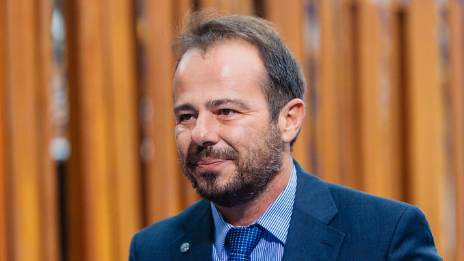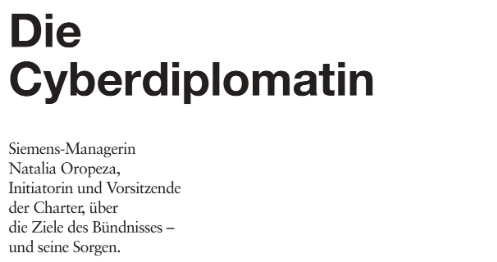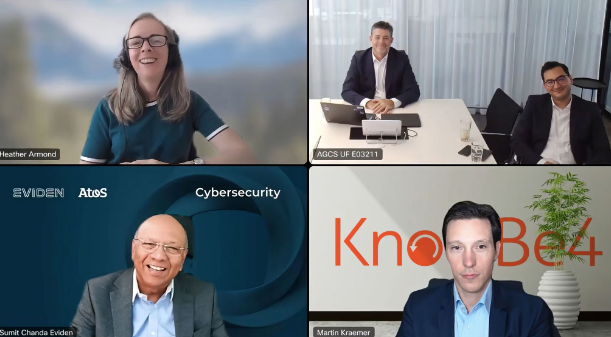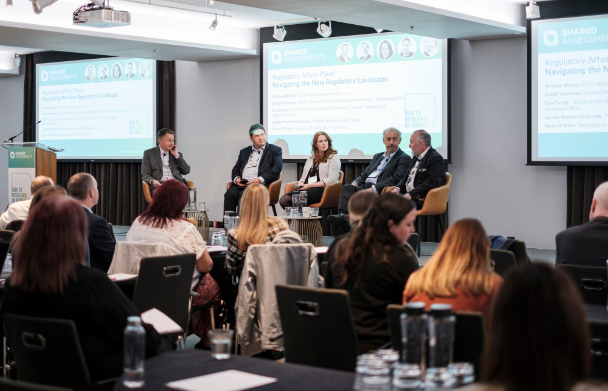On 27 May, over 100 attendees dialed in from Asia, Africa, the US, and Europe for the Charter of Trust’s online roadshow: “Stronger cybersecurity during the COVID-19 pandemic.”
The session was introduced by Pierre Barnabé, SEVP Cybersecurity in Atos, painting the context of the Charter of Trust’s creation and emphasizing how critical it is to set the scene and educate people to develop cyber protection.
Focused on European policies, the conversation was led by Jakub Boratyński Acting Director for Digital Society, Trust and Cybersecurity, DG CNECT. During his keynote session he presented EU cybersecurity policy actions in 2020 among which the review of the Network and Information Security Directive being an important policy action – in this context he highlighted the importance of services delivered online in particular during the COVID-19 crisis which has shown how essential digital infrastructures across all walks of life have become.
Our panel discussion welcomed our key panelist Georgios Chatzichristos, Network and Information Security Officer at ENISA, followed by several representatives of Charter of Trust. ENISA walked us through the initiatives they have undertaken to provide cybersecurity guidance for people working from home.
The panel discussion highlighted the necessity of collaboration, particularly in the area of better information and threat intelligence sharing. The first panel discussion focused on the recently started threat intelligence initiative within the Charter of Trust – Principle 8, in which partners will work out how they can most effectively learn from each other by sharing indications of compromise from different industry sectors and outwit or cyber security adversaries.
The second discussion highlighted the work the Charter has done on cyber security education, our Principle 6, in particular the focus on helping small and medium sized enterprises with the cyber security handbook which the Charter recently published. The dialogue also focused on the important work that the Charter is leading on Security by Default, Principle 3, setting out requirements and recommendations for baking security in at the core of products and services.
In the final round of closing comments, speakers emphasized how trust is more needed than ever and how cybersecurity is the key success factor for digitization, which is more crucial than ever before as businesses and government have moved quickly to new ways of providing services and doing business. Better cybersecurity must underpin these new business models and the Charter of Trust is more relevant than ever in terms of its goals and objectives. If you would like more information on any of the above initiatives, please contact us.
Stay tuned for more Charter of Trust virtual events. Similar online roadshows are planned in Tokyo and Washington D.C., as well as deep-dive webinars on the Charter of Trust Principles such as “Education,” “Security by Default,” and “Transparency and Response.”




You may also like

Chairwoman Natalia Oropeza in Brandeins Magazine
In an interview with Dorit Kowitz, Natalia dives deep into the pressing issues facing the cybersecurity landscape, explaining how the Charter of Trust bundles the expertise of different businesses across several regions to stay resilient in the face of evolving threats. As Natalia Oropeza says: "We all win if cybercrime doesn’t win."
Here are three key insights from her interview:
🔑 Collaboration is essential: No single organization can tackle cyber threats alone. The Charter of Trust is a prime example that businesses nowadays are more transparent when it comes to attacks and that sharing information in this field can be beneficial.
🔑 Addressing the digital skills gap: The Charter of Trust is working to address the global shortage of cybersecurity professionals by encouraging diversity and actively promoting opportunities for women to join the field.
🔑 Unified regulations: Harmonizing global cybersecurity standards will reduce vulnerabilities, helping businesses and governments combat threats more effectively.
The full interview is available here: https://lnkd.in/gRm6ZDGC


Cybersecurity Awareness Month
The complexity and urgency of this topic gathered a lot of interest, with 600+ attendees throughout the whole panel, which was composed of Jon-Paul Jones, COO at AZ Commercial, Firas Ben Hassan, GenAI expert & Manager of AllianzGPT at AZ Technology, Dr. Martin J. Krämer, External Security Awareness Advocate at KnowBe4, and Dr Sumit Chanda, Global CISO at Eviden & Chair of the Global External Engagement Working Group at the Charter of Trust.
We are pleased to see Dr. Sumit Chanda from Eviden bringing in his unique CISO insight on what these emerging technologies mean in day-to-day cybersecurity practices and bringing in the Charter of Trust perspective on this topic as well.
Thank you, Ervin Cihan and Haydn Griffiths for inviting other CoT Partners and for the great initiatives that Allianz is putting together within this year’s Security Awareness Month. And special thanks to Heather Armond for the great moderation.


UK/EU Summit - “Risk to Resilience”
💡Under the theme “Risk to Resilience” the first event of this series was held in London and brought together professionals from different industries and regions. Detlef participated in the panel about the complex regulatory landscape and emphasized that new legislation like the EU AI Act, DORA and Hashtag#NIS2 continue to push the standard of care on cybersecurity and other risks.
Thanks to Shared Assessments for organizing such an amazing event and inviting the Charter of Trust to participate in this high-class panel alongside Andrew Moyad, CEO at Shared Assessments.



